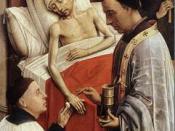13 Is anyone among you suffering? He should pray. Is anyone in good spirits? He should sing praise. 14 Is anyone among you sick? He should summon the presbyters of the church, and they should pray over him and anoint [him] with oil in the name of the Lord, 15 and the prayer of faith will save the sick person, and the Lord will raise him up. If he has committed any sins, he will be forgiven. (James 5:13-15)
Vatican II states: "'Extreme Unction,' also called 'anointing of the sick,' is not a sacrament for those only who are at the point of death. As soon as anyone of the faithful begins to be in danger of death from sickness or old age, the appropriate time for him to receive this sacrament has certainly arrived" (Constitution on the Sacred Liturgy, Sacrosanctam Concilium SC 73).
"This sacrament of the living, when in the providence of God and expedient for the welfare of the soul, sometimes restores health through the aid given to natural or bodily forces or agents for the overcoming of dangerous illnesses.
Therefore, it is of importance that the faithful seek to receive this anointing as often as they become ill and certainly whenever the threat of one's life is present because of sickness. Although it is not a necessary means of salvation, no one should for light reasons forego this sacrament. Some maintain that there is an obligation to receive it whenever possible and to fail to do so out of vanity or negligence would be seriously sinful.
The matter of the sacrament is olive oil or if necessary a vegetable oil, properly blessed for this use by a bishop or a priest who has the faculty to do so. It is sufficient to make a single...


